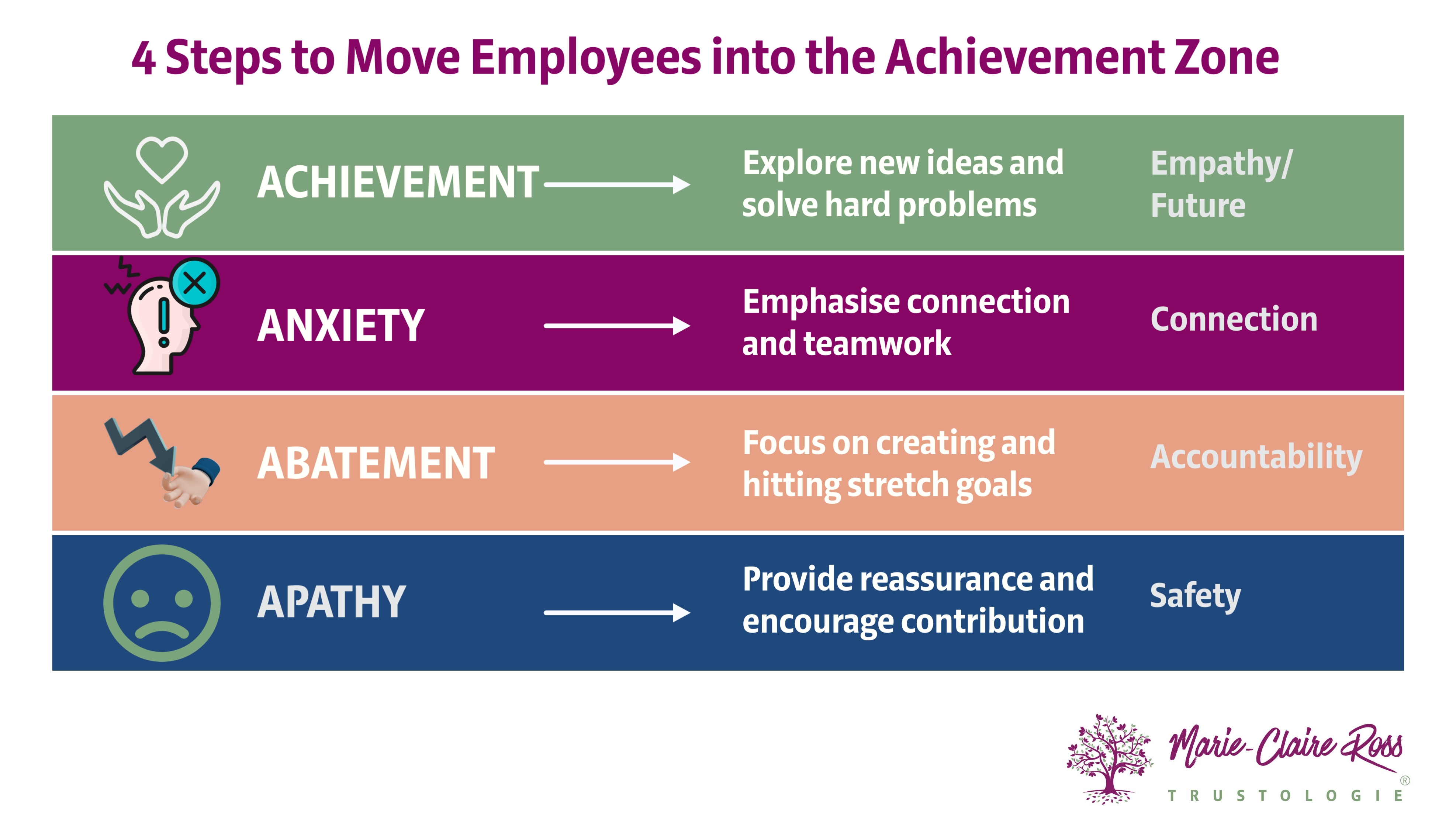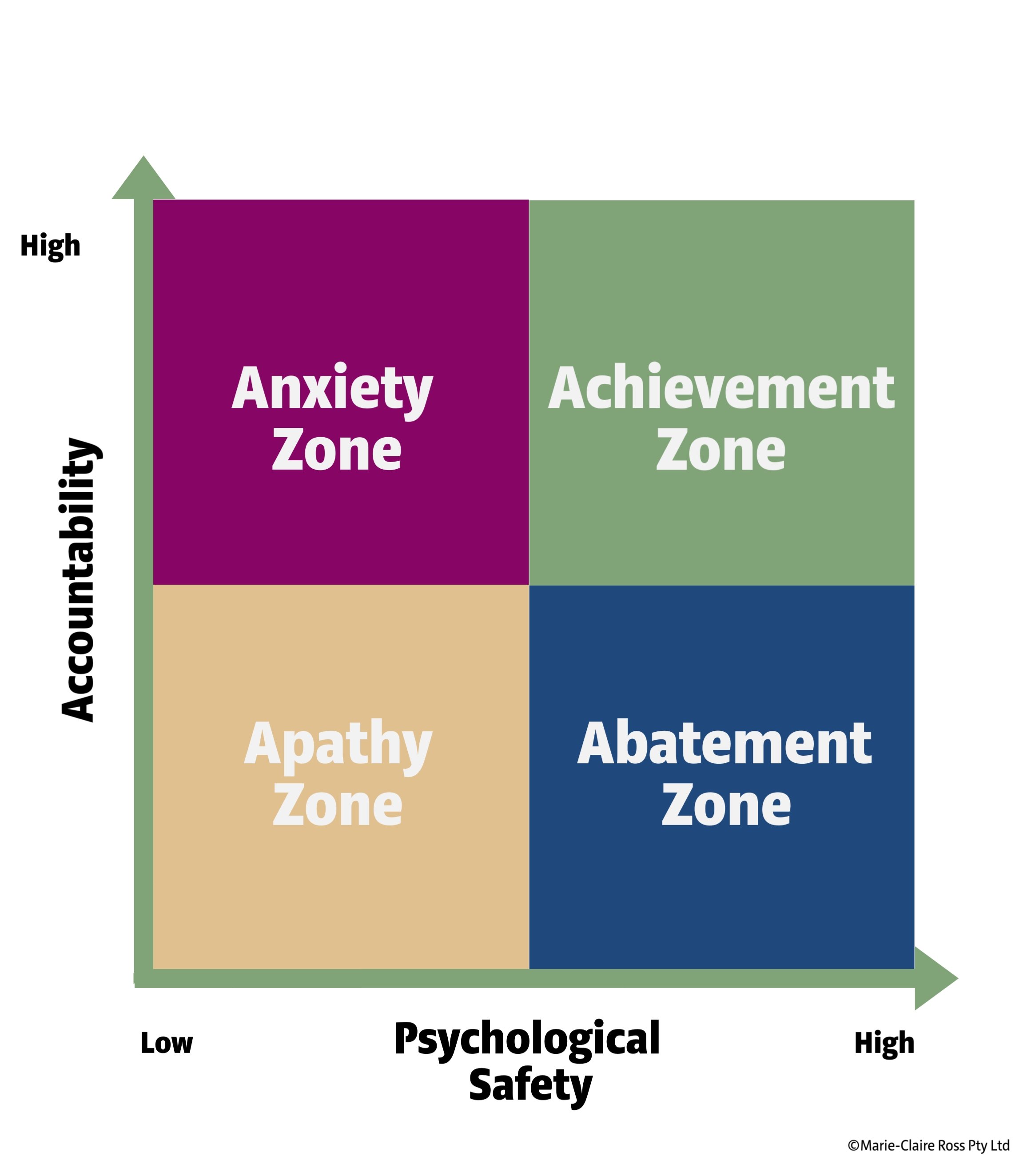9 min read
5 Ways Emotional Intelligence Transforms Your Leadership Presence Today
True leadership presence isn’t a performance or a set of charisma hacks; it is the felt experience of who you are being in the room. By cultivating...
Develop leaders, strengthen executive teams and gain deep insights with assessments designed to accelerate trust and performance.

Transform how your leaders think and perform with keynotes that spark connection, trust and high-performance cultures.

Explore practical tools, thought-leadership and resources to help you build trusted, high-performing teams.

Trustologie® is a leadership development consultancy founded by Marie-Claire Ross, specialising in helping executives and managers build high-trust, high-performing teams.

8 min read
Marie-Claire Ross : Updated on January 22, 2026

Table of Contents
1. Be Clear in your Leadership Brand
2. Practise personal responsibility and accountability
3. Develop self-awareness in leadership and emotional intelligence
5. Set clear goals and priorities
6. Trust yourself and improve your self-confidence
7. Build resilience and courage
Frequently Asked Questions on Self-Leadership
What is self-leadership and why is it important for my career and life?
How can self-leadership help me advance in my career?
What are some practical ways to develop self-leadership skills?
Can self-leadership also benefit my personal life outside of work?
How can I start implementing self-leadership practices into my daily routine.
The most effective leaders don’t just lead teams—they lead themselves first.
Self-leadership is the foundation upon which effective leadership is built.
After all, if you can't lead yourself first, you will have issues with inspiring others to follow you.
It's not easy because it means having the courage and discipline to do what's right for you and others. This article will guide you through nine impactful ways self-leadership can elevate your career and enrich your life.
Gain control over your career and personal journey through self-leadership
Know your leadership vision
Foster personal accountability and create a supportive environment for growth
Develop self-awareness and emotional intelligence for better decision-making
Be easy to work with
Set clear goals and priorities to enhance productivity and success
Trust yourself to lead others
Build resilience and manage stress for improved well-being and performance
Improve your willpower and self-discipline
Embrace continuous learning for career satisfaction and adaptability

Self-leadership is your ability to take control of your personal and professional journey. It's about being the captain of your ship, steering towards success with intention and discipline. You know what you want, and you lead yourself to weather the ups and downs in getting there.
Let's take a look at the steps you need to take to better lead yourself and your team.
Defining your leadership brand establishes how you intend to interact, communicate with others and deliver results. It serves as a succinct and inspiring declaration of the why behind your leadership rather than the how. It's about knowing your leadership style and working with your innate skills, not against them.
If you are like most leaders that I meet, they often model their leadership behaviours by mirroring the practices of leaders around them.
Rather than trying to conform to a specific mould, it's best to seek out a variety of leadership strategies and apply them in the way that suits you. This requires leading intentionally, rather than just going with the flow. Otherwise, we can exhaust ourselves, when we try to live up to behaviours and habits that don't even suit our personality.
Self-leadership is knowing who you are and how you want to be seen by others in the workplace. It requires setting a clear vision for your life and career. It enables you to create an aspirational leadership brand that guides you as to how you want to be in the future and help you navigate challenges with confidence.
Accountability is the cornerstone of self-leadership. It drives you to take ownership of your actions and their outcomes, enhancing your credibility and integrity. By fostering accountability, you build trust and respect among peers and leaders, positioning yourself as a reliable and responsible professional.
Holding yourself accountable involves setting high standards and consistently meeting them. It requires commitment and discipline to follow through on your promises and deliver results. By setting clear expectations for yourself, you ensure that your actions align with your goals and values, enhancing your performance and reputation.
Accountability combined with psychological safety also fosters a high-performance team enabling a culture of trust and integrity. Taking responsibility for your actions and setting an example for others to follow, encourages a culture of transparency and collaboration.
Self-leadership starts with knowing yourself. It's about taking the time to learn about who you really are and how that defines you as leader.
It's about understanding your triggers, strengths and weaknesses, combined with understanding how other people see you. This involves working on your intrapersonal (“within the self”) skills. These are our internal abilities and behaviours that help us manage our emotions, cope with challenges, work within deadlines and learn new information.
Research has found the more we learn to understand ourselves, the more likely we will work to understand others which ensures we have more compassion and empathy.
The truth is leadership success is not about your talent, cognitive intelligence or work ethic. It's about your mindset, how you perceive your role, collaborate with others, handle uncertainty, and your commitment to growth.
When you take the time to self-reflect on your thoughts and actions, it enables you to approach challenges with resilience and adaptability. Again, personal accountability plays a pivotal role here. When you hold yourself accountable, you know that you are in charge of how you react to whatever occurs in your life.
Self-awareness empowers you to identify your emotional triggers, enabling you to manage stress effectively.
Imagine a scenario where a high-stakes project deadline is looming, and stress levels the team are high. A self-aware individual acknowledges their stress, assesses its source, and employs strategies to remain calm and focused. This approach not only improves job performance but also enhances overall well-being. It also means they are less likely to blame or find fault with others.
Improving your self-awareness can take a variety of forms from doing a personality assessment (e.g. I use Enneagram in my coaching), journalling, working with a therapist or executive leadership coach or even doing yoga.
Many years ago a business coach that I worked with in America told me and fellow participants to be "easy to work with." As consultants, she told us that our clients were all very busy, and we needed to do what we could to make working with us easy rather than a burden. I laughed at what I thought was quite an obvious statement.
Yet, some of my colleagues were asking questions that they could easily work out themselves such as "what is your address?" or "what's your industry?" Placing more work on their client than was necessary (and making themselves look a bit dumb and lazy in the process).
Sadly, I see this with employees all the time.
Self-leadership means being self-reliant and independent. It also means being easy to work with.
Consider:
Self leadership requires leading and influencing ourselves. If you keep needing other people to self-soothe or validate you or give you motivation, it means you have some work to do on your self.
Great leaders set clear goals and priorities steering their career and life in the right direction. Goals provide you with a road map, guiding your actions and decisions towards your desired outcomes. By defining your aspirations, you create a sense of purpose that fuels your motivation and commitment.
Cognitive control enables executives to pursue a goal despite distractions and setbacks. The same neural circuitry that allows such a single-minded pursuit of goals also manages uncontrolled emotions. Good cognitive control can be seen in people who stay calm in a crisis, manage their own inner turmoil, and recover quickly from a debacle or defeat.
It also means being able to best prioritise and plan tasks appropriately. After all, those around you will distrust your leadership if you miss deadlines or appointments.
What is most important is that you use your goals to give you a sense of progress. Think about what makes most people happy at work - is it seeing things stay the same or things getting better? We all love to see things improving and that we are growing. Use goals to give you evidence of a sense of progression and change.
Trusting ourselves is essential, especially when we stumble, face harsh criticism, or fall short of our goals. It's in these moments that our self-trust can waver, and our confidence can take a hit. This is detrimental to our leadership capability as our decision-making falters when we fear making the wrong choice.
Whatever makes you distrust yourself, the most important thing is to learn to trust yourself to be a good leader. If you feel that this is an issue for you, consider working with a therapist or executive coach to help you feel more confidence in yourself.
When you trust yourself, you make clearer decisions, navigate uncertainty with confidence, and set the tone for those around you. Without self-trust, doubt creeps in, hesitation takes over, and leadership impact weakens.
Resilience is your ability to bounce back from setbacks and maintain momentum in the face of challenges. It's a vital skill for thriving in today's dynamic work environment, where change and uncertainty are constant.
A resilient mindset fosters adaptability, allowing you to embrace change and uncertainty with confidence. Instead of fearing failure, resilient individuals view setbacks as opportunities for growth and learning. This positive outlook enables you to navigate challenges with perseverance and determination, ultimately strengthening your resolve.
Improving your resilience requires knowing what lights you up and helps you during tough times. It also helps to work with your brain, so that you are not over-loading it. This might be going for a walk, patting your dog or reading poetry. Put together some tips you can use to improve your confidence and motivation, so you can lead with your effective self.
Being disciplined with managing our time is an important intrapersonal skill. This requires having the willpower to look at yourself and make improvements. It means getting up early to exercise or not watching television late at night. It requires having the cognitive control to do the rights things - for yourself and others.
Years of extensive research highlight the crucial role of willpower in achieving leadership success.
Knowing when you work the most productively and working with your body is important. This means scheduling meetings when you are at your most efficient or tackling tasks at the right time of day for you. For example, for many of us, tackling difficult work is better done first thing in the morning, while after lunch tasks are better suited to admin, when our brains seem to be working slower.
Taking care of our bodies is essential for a fulfilling life. In a professional context, this involves avoiding overwhelming ourselves, prioritising breaks, taking time off, ensuring adequate rest, and nourishing ourselves with wholesome foods.
In today's rapidly changing job market, continuous learning is not just a choice; it's a necessity. Embracing lifelong learning keeps your skills relevant and opens new opportunities for career advancement. By prioritising growth and development, you enhance your career satisfaction and adaptability, positioning yourself for success in an ever-evolving world.
Learning new skills boosts your confidence, self-trust and expands your professional network. Whether it's enrolling in an online course, attending workshops, or seeking leadership coaching, investing in your education enhances your expertise and broadens your horizons. Continuous learning also fuels innovation and creativity, enabling you to contribute fresh ideas and solutions to your work.
Staying curious and open-minded is essential for fostering a growth mindset. By embracing new experiences and challenges, you cultivate a sense of curiosity and wonder, driving your personal and professional development. This mindset encourages you to explore diverse perspectives and seek out new knowledge, enriching your understanding and capabilities.
Additionally, embracing continuous learning helps you adapt to the ever-changing job market. As industries evolve and technologies advance, staying informed and adaptable ensures that you remain competitive and relevant. By committing to lifelong learning, you future-proof your career and position yourself as a valuable asset in any organisation.
In today's rapidly changing work environment, self-leadership is not a luxury—it's a necessity. It requires discipline, humility, emotional intelligence, and empathy, qualities that distinguish successful leaders. By cultivating these skills, you gain the ability to influence not just your career, but also the lives of those around you. After all, leadership begins with self-awareness and the courage to lead yourself towards your goals.
Self-leadership is the ability to take control of your own actions, thoughts, and emotions in order to achieve your goals and lead yourself towards success. It is important for your career and life as it helps you become more proactive, confident, and resilient in facing challenges and seizing opportunities.
Self-leadership can help you advance in your career by enhancing your decision-making skills, boosting your self-confidence, improving your time management abilities, fostering better relationships with colleagues, and increasing your overall productivity and effectiveness in the workplace.
Some practical ways to develop self-leadership skills include setting clear goals for yourself, maintaining a positive mindset, practising self-discipline and self-control, seeking feedback and continuous learning, building strong communication skills, and taking ownership of your actions and responsibilities.
Yes, self-leadership can benefit your personal life outside of work by helping you achieve a better work-life balance, manage stress and emotions more effectively, build stronger relationships with family and friends, and cultivate a sense of purpose and fulfilment in all areas of your life.
You can start implementing self-leadership practices in your daily routine by setting aside time for self-reflection and goal-setting, practising mindfulness and self-awareness, developing a growth mindset, prioritising self-care and personal development, and consistently taking action towards your goals and aspirations.

9 min read
True leadership presence isn’t a performance or a set of charisma hacks; it is the felt experience of who you are being in the room. By cultivating...

13 min read
As teams return from their summer (or winter) break, you may notice subtle shifts in your team’s energy. Even if the end of year was positive, a new...

14 min read
The workplace is evolving at a pace few previous generations have seen and 2026 will mark a turning point. The Future of Work is blended, not hybrid....

Leading oneself is the foundation upon which effective leadership is built. Without self-leadership, it becomes difficult to inspire and guide others...

Recently, one of the biggest complaints that I have been hearing about leaders is how a lack of self-awareness is impacting their performance....

In the workplace, we all know the importance of accountability as a leader. Yet, rarely do we talk about how personal responsibility drives...